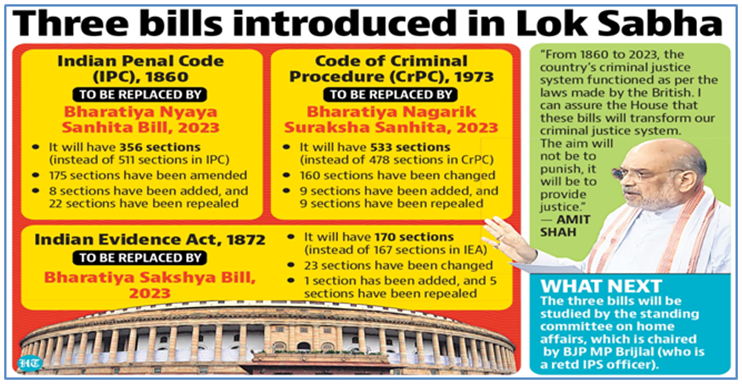Why in News?
- The Parliamentary Standing Committee on Home Affair postponed its adoption of a draft report on three Bills seeking to replace the existing criminal laws, after pressure from the Opposition seeking more time to examine it.
What’s in Today’s Article?
- Three Bill to Replace Existing Criminal Laws
- The Parliamentary Panel’s Consultations on the Three Bills
- Some Concerns Raised by the Members of the Parliamentary Panel
Three Bill to Replace Existing Criminal Laws:

- The Union Home Minister introduced the Bharatiya Nyaya Sanhita Bill 2023, the Bharatiya Nagarik Suraksha Sanhita Bill 2023 and the Bharatiya Sakhshya Bill 2023 in the Lok Sabha in August 2023 (Monsoon Session of Parliament).
- The Indian Penal Code 1860 will be replaced by the Bharatiya Nyaya Sanhita Bill 2023.
- The Criminal Procedure Code 1973 will be replaced by the Bharatiya Nagarik Suraksha Sanhita Bill 2023, and
- The Indian Evidence Act 1872 will be replaced by the Bharatiya Sakshya Bill, 2023.
- These three Acts which will be replaced, were made to strengthen and protect the British rule and their purpose was to punish, not to give justice.
- Hence, the soul of these three new laws will be to protect all the rights given by the Constitution to the Indian citizens.
- The objective will not be to punish anyone but to give justice and in this process punishment will be given where it is required to create a sense of prevention of crime.
The Parliamentary Panel’s Consultations on the Three Bills:
- Consultation on the Hindi names of the Bills:
- One of the key points of contention, the Hindi nomenclature of the Bills, has not been accepted in the draft reports circulated so far.
- The panel’s report on the Bharatiya Nagarik Suraksha Sanhita 2023, states that since the text of the Bill is in English, it does not violate the provisions of Article 348 of the Constitution.
- Article 348 says that the language to be used in the Supreme Court and High Courts as well as for Acts, Bills, and other legal documents shall be English.
- Redrafting key provisions that were brought to tackle organised crime:
- The Bharatiya Nyana Sanhita 2023, which seeks to replace the IPC, introduced new provisions to define and penalise “organised crime”.
- Section 109 of the proposed law defines an organised crime syndicate to include a “gang, mafia or (crime) ring” involved in “gang, criminality, racketeering and syndicated organised crime.”
- The deliberations by the panel are likely to lead to a recommendation to re-draft this provision.
- It is learnt that while the panel feels that the provision is a very effective addition, many terms used must be clearly defined to avoid uncertainty.
- It is learnt that the scope of organised crime in the proposed law is much wider, even when compared with the stringent Maharashtra Control of Organised Crime Act (MCOCA) 1999.
- Bringing back the provision criminalising adultery:
- There is a view leaning in favour of bringing back the provision criminalising adultery (Section 497 of the IPC) and non-consensual ‘unnatural sex’ (Section 377 of the IPC) which have been removed in the new Bills.
- The SC, in a landmark ruling in 2018, had decriminalised adultery. Some have raised concerns that there is a need to keep the provision in order to safeguard the sanctity of the institution of marriage.
Some Concerns Raised by the Members of the Parliamentary Panel:
- Few members urged the panel to stop bulldozing these Bills for short-term electoral gains.
- Hurrying through the Bills would amount to mocking the process of “legislative scrutiny”.
- The Bills need extensive consultations with the governments and stakeholders in the States.
- The panel’s chairman told the members that the draft reports slated to be adopted at the meeting as per the circulated agenda would be withheld.
- However, he did not state the reason for doing so. This drew sharp criticism from the members.
- The Hindi nomenclature of the Bills is exclusionary for a large section of the country.
- The Bills are largely a copy of the existing codes which could have been amended instead of bringing in new legislation.









